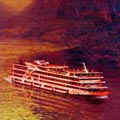|
By Jackie Alan Giuliano, Ph.D.
While I have no doubt of the sincerity of the efforts of environmental organizations worldwide to promote a more sustainable approach to tourism, most of the world tour operators use ecotourism claims as marketing ploys rather than as statements of true philosophical commitments.
Global tourism, while allowing some the opportunity to meet people, visit exotic environments, and understand cultures, provides billions of dollars to the corporations that are raping, polluting, and destroying the Earth, her people, and her animals. Of course there is ample corporate support for ecotourism efforts, and nations all over the world are getting help opening their doors to rampant consumerism and corporate takeover of every aspect of our world.
The vast majority of tourists are not folks with sustainability and community building on their minds who stay with local families and respect local customs. The vast majority of tourists sail in on huge cruise ships or fly in to stay in large hotels and take advantage of local people.
Pera and McLaren said, "Tourism introduces a consumer culture into communities whose societies and values may not be based on the economic power of the individual. Tourists' quest for 'authenticity' often leads to a prostitution of the local culture for the demand and enjoyment of the tourists."
It is important to note that the introduction of Western products and lifestyle into developing nations is actively promoted by the World Trade
Organization.
Cruise ships are among the most obscene offenders. For example, each day, whether at sea or in port, a typical cruise ship passenger may generate one kilogram (2.2 pounds) of burnable waste, half a kilogram of food waste and one kilogram of glass and tin - five or six times as much as a person on shore. On a ship carrying 3,000 passengers, this could be as much as 7,500 kilograms a day (16,500 pounds) of waste, much of which is dumped at sea into fragile marine ecosystems.
In fact, most international treaties governing cruise ship pollution specifically allow ships to dump waste, including untreated human waste, at sea. Every month, 200 cruises take 400,000 visitors to Caribbean ports alone.

Sailing in the Yangtze River's Three Gorges, China (Photo courtesy
Yangtze Cruise
Lines)
Global corporations, promising a tidal wave of income to local cultures, lure men and women all over the world to become slave laborers to the tourism trade. Local people are forsaking feeding and supporting their families as farmers or workers in sustainable jobs in their own communities in favor of demeaning jobs playing the simple foreigner to visiting affluent tourists who couldn't care less about their cultures.
I think there needs to be a serious reality check done by ecotourism proponents about this idea that tourism will generate world peace and environmental harmony. What it does generate is deadly pollution, toxic chemicals and waste, the destruction of ecosystems, and the erosion of communities, turning local people into agents of the world's corporations.
While I applaud the efforts of organizations around the world to change the damaging effects of tourism, encouraging more people to travel through ecotourism may just be contributing to the problem. And I support those compassionate individuals who travel to be with people, not to take advantage of them. But as long as we have leaders committed to a global economy bent on developing every inch of the globe, ecotourism efforts may be playing into the hands of global corporations.
Possibly the best recommendation toward healing the tourism issues is to begin a worldwide effort to restore damaged cultures and twisted economies - and to ask people to just stay home.
RESOURCES
1. I have written about the tragic issue of cruise ship pollution for the Environment News Service in a commentary called "Cruise Ship Pollution - A Holiday of Toxins.: You can see it at
http://www.ens-news.com/ens/feb2000/2000L
-02-05g.html.
2. Learn about a number of books challenging tourism at http://www.geocities.com/~nesst/
tourismstudies.htm.
3. See some of the damage caused by tourists to fragile ocean environments at
http://seawifs.gsfc.nasa.gov/OCEAN_
PLANET/HTML/peril_tourism.html.
4. See a thorough article by Pera and McLaren about the problems with ecotourism at
http://www.planeta.com/ecotravel/
resources/rtp/globalization.html.
5. Read about the ecotourism experience of Estonia at http://www.ee/ecotourism/
ar-rio-2.htm.
6. See the United Nations resolution declaring 2002 as the International Year of Ecotourism at
http://www.un.org/documents/
ecosoc/res/1998/eres1998-40.htm.
7. Read about globalization and tourism at http://www.twnside.org.sg/title/
chavez-cn.htm.
8. Find ecotourism resources at http://www.planeta.com/ecotravel/tour/
year.html and http://webhome.idirect.com/~tourism/
resp.html.
{Jackie Alan Giuliano, Ph.D. is a writer and teacher in Seattle. He can be found visiting local parks and natural areas with his family. Please send your thoughts, comments, and visions to him at
jackie@healingourworld.com
and visit his web site at http://www.healingourworld.com}
http://ens-news.com/ens/sep2001/2001L-09-07g.html
|
